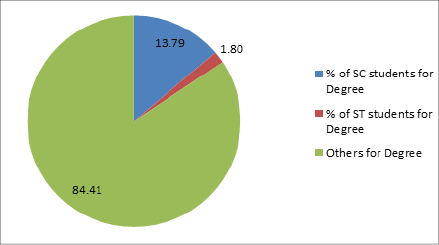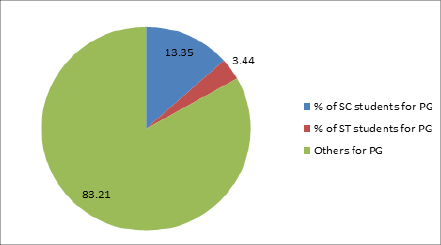Social Service
University and Higher Education
The significance of higher education in a society has been increasingly recognised and in the absence of a well-educated workforce, an economy cannot harness its optimum capabilities. The significance of higher education is not restricted to the sphere of economy and workforce alone; rather it should be seen as an opportunity for conditioning future citizens who are not only competent as a workforce but are also responsible citizens who can address the social needs in a more matured and responsible manner.
There are 14 universities functioning in the State. Out of these, four universities viz. Kerala, Mahatma Gandhi, Calicut and Kannur are general in nature and are offering various courses. Sree Sankaracharya University of Sanskrit, Thunchath Ezhuthachan Malayalam University, Cochin University of Science and Technology, Kerala Agricultural University, Kerala Veterinary and Animal Science University, Kerala University of Health Sciences, Kerala University of Fisheries and Ocean Studies and Kerala Technological University offer specialized courses in specified subject areas. Besides these, the National University of Advanced Legal Studies (NUALS) established in 2005 and a Central University started in Kasargod district are also functioning in the State.
Rashtriya Ucchatar Shiksha Abhiyan
In order to ensure access to and improve the quality of higher education, a new overarching Centrally Sponsored Scheme, Rashtriya Ucchatar Shiksha Abhiyan (RUSA) was commenced during the 12th Five Year Plan period for funding the State level higher education institutions. It is an umbrella scheme to be operated in mission mode, which seeks to improve the overall quality of existing State higher educational institutions. The scheme is implemented through a set of bodies with clearly defined roles and functions at the National, State and Institutional level. The allocation of funds under RUSA is based on well-defined norms and parameters. The Scheme would cover only the Government and Government aided institutions.
As a first instalment, an amount of Rs. 2.5 crore each has been released to 4 universities in the State: University of Calicut, University of Kerala, M G University and Sree Sankaracharya Sanskrit University for improving the infrastructural facilities. Out of this amount, apart from the renovation and repair works, innovative projects like installation of Solar Energy system, Bio metric punching system and E-campus, purchase of Nuclear Magnetic Resonance Spectrometer and diesel generator set have been set up by the Universities. 15 Government colleges also received Rs 12.5 lakh each as infrastructural grant. From the preparatory grant of RUSA, seminars, workshops and trainings are being conducted. Implementation of Video Conferencing System in Institutions, Laptops and Special Software for differently-abled students, E-journal Portal for RUSA and RUSA State Project Directorate Library are the schemes implemented as best practices under RUSA State Project Directorate.
Autonomous Colleges in Kerala
The affiliating system of colleges was originally designed when their number in a university was small. The university could then effectively oversee the working of the colleges, act as a body conducting examination and award degrees on their behalf. The system has now become unwieldy and it is becoming increasingly difficult for a university to attend to the varied needs of individual colleges. The colleges do not have the freedom to modernize their curricula or make them locally relevant. The regulations of the university and its common system, governing all colleges alike, irrespective of their characteristic strengths, weaknesses and locations, have affected the academic development of individual colleges. Colleges that have the potential for offering programmes of a higher standard do not have the freedom to offer them.
Hence, the Committee on autonomy for institutions of higher education in Kerala stated in its report that there are colleges in Kerala in the Government and private sectors which deserve autonomy and which can prove their full academic potential if only greater freedom is given to take risks with responsibility. The University Grants Commission (UGC) has granted autonomous status to nine colleges in the State during 2014-15. The colleges are Maharaja’s College, Ernakulam; Mar Ivanios College, Thiruvananthapuram; Fatima Mata National College, Kollam; SB College, Changanassery; St. Teresa’s College, Ernakulam; Sacred Heart College, Thevara; Rajagiri College of Social Sciences, Kochi; St. Thomas College, Thrissur and St. Thomas College, Devagiri.
Arts And Science Colleges
There are 213 Arts and Science Colleges in the State comprising of 153 Private Aided Colleges and 60 Government Colleges. In 2015-16, Ernakulam (25) had the largest number of Arts and Science colleges in the State followed by Thiruvananthapuram, Kottayam and Thrissur (22). Thiruvananthapuram and Kozhikode have the largest number of Government colleges (10) in the State. District-wise number of Arts and Science colleges in the State in 2015-16 is given in Appendix 4.26.
Enrolment of Students
Total number of students enrolled in various Arts and Science colleges (excluding unaided colleges) under the four general universities in Kerala during 2015-16 is 2.7 lakh. Of this 1.89 lakh (71.21 per cent) are girls.
Out of the total students enrolled for degree courses, 41.7 per cent are enrolled for B.A degree courses, 41.1 per cent enrolled for B.Sc. and 17.2 per cent enrolled for B.Com degree courses. Girls constitute 71.02 per cent of total enrolment for degree courses ( Table 4.3).
Table 4.3
Enrolment of Students in Arts and Science Colleges
| Course | Total Students | Girls | Boys | Per cent of Girls |
| B.A | 96748 | 70035 | 26713 | 72.39 |
| B.Sc | 95369 | 69833 | 25536 | 73.22 |
| Bcom | 39923 | 24915 | 15008 | 62.41 |
| Total | 232040 | 164783 | 67257 | 71.02 |
Source: Directorate of Collegiate Education
27 subjects are offered for BA degree courses. Among the subjects, Economics has the largest number of enrolment of students. 31 subjects are offered for B.Sc. course and Mathematics has the largest number of student enrolment. Details of enrolment of students in Arts and Science colleges for BA, B.Sc. and B.Com are given in Appendix 4.27, Appendix 4.28, Appendix 4.29. 33,070 students were admitted to post graduate course in the State in 2015-16. 72.6 per cent of those enrolled in PG courses are girls. Details of enrolment of students in Arts and Science colleges for MA, MSc and M.Com courses are given in Appendix 4.30, Appendix 4.31and Appendix 4.32.
Scheduled Caste /Scheduled Tribe Students
The enrolment of Scheduled Caste (SC) students in degree and post graduate courses in the State is 32,002 and 4,414 respectively. SC students constitute 13.74 per cent of total students in 2015-16. Girls constitute 71.1 per cent of total SC students in Arts and Science colleges (Table 4.4 and Figure 4.4).
Table 4.4
Percentage of SC/ST students in higher education
| Course | Total Number of Students | Number of SC Students | Per cent of SC students | Number of ST students | Per cent of ST students | Total number of SC-ST students | Per cent of SC/ST students |
| B.A | 96748 | 13295 | 13.74 | 2584 | 2.67 | 15879 | 16.41 |
| B.Sc | 95369 | 13103 | 13.74 | 890 | 0.93 | 13993 | 14.67 |
| Bcom | 39923 | 5604 | 14.04 | 710 | 1.78 | 6314 | 15.82 |
| Total Degree students | 232040 | 32002 | 13.79 | 4184 | 1.80 | 36186 | 15.59 |
| M A | 12602 | 1889 | 14.99 | 594 | 4.71 | 2483 | 19.70 |
| M Sc | 15360 | 1853 | 12.06 | 422 | 2.75 | 2275 | 14.81 |
| M Com | 5108 | 672 | 13.16 | 121 | 2.37 | 793 | 15.52 |
| Total P G Students | 33070 | 4414 | 13.35 | 1137 | 3.44 | 5551 | 16.79 |
| Total degree & PG | 265110 | 36416 | 13.74 | 5321 | 2.01 | 41737 | 15.74 |
Source: Directorate of Collegiate Education
Figure 4.4
Percentage of SC/ST students in Degree and PG Courses


Source: Directorate of Collegiate Education
The number of Scheduled Tribe students enrolled for courses in arts and science colleges in 2015-16 is 5321. The enrolment of ST students in degree and post graduate courses are 4,184 and 1,137 respectively. Girls constitute 65.9 per cent of the total ST enrolment in Arts and Science colleges. Enrolment of SC and ST students in Arts and Science Colleges in Kerala during 2015-16 is given in Appendix 4.33.
Scholarships
Central and state sector scholarships of 14 types are given to students. Various scholarships including Kerala State Suvarna Jubilee Scholarship (4000) and post metric scholarships (47199) were given during 2015-16. The Directorate of Collegiate Education has set up LED display board giving the details of scholarships offered by the Government of Kerala and India. The details of number of scholarships offered from 2013-14 to 2015-16 is given in Appendix 4.34.
Teachers
The number of teachers in Arts and Science colleges in the State in 2015-16 was 9727, out of whom 55.2 per cent are women. University-wise number of teachers in Arts and Science colleges in the year 2013-14 to 2015-16 is given in Appendix 4.35. 3312 (34.01 per cent) teachers in Arts and Science colleges in the State have a Ph.D. degree. Details are given in Appendix 4.36. A total of 2072 Guest Lecturers were working in Arts and Science colleges of the State in 2016. Details are given in Appendix 4.37.
Kerala Council for Historical Research (KCHR)
Kerala Council for Historical Research is an autonomous academic institution, established in 2001, committed to scientific research in archaeology, history and social sciences. It is a recognized research centre of the University of Kerala and has academic affiliations and bilateral academic and exchange agreements with leading universities and research institutes in India and abroad. KCHR is envisaging publishing a comprehensive volume on the scientific history of Kerala from pre-historic to the present times.
A sustainable/historical tourism project is conceived in the Kodungallur-Paravur zone and KCHR is identified as the nodal agency to provide technical assistance. From 2006-07 onwards, KCHR has successfully undertaken the multi-disciplinary excavation at Pattanam. The excavation has yielded significant evidences for re-conceptualizing the early history of Kerala.

